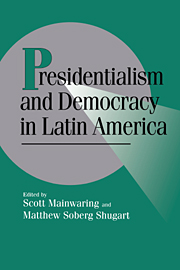Book contents
- Frontmatter
- Contents
- Contributors
- Acknowledgments
- Introduction
- 1 Presidentialism and Democracy in Latin America: Rethinking the Terms of the Debate
- 2 Multipartism, Robust Federalism, and Presidentialism in Brazil
- 3 The Unrealized Potential of Presidential Dominance in Colombia
- 4 Presidential Behavior in a System with Strong Parties: Venezuela, 1958–1995
- 5 Strong Candidates for a Limited Office: Presidentialism and Political Parties in Costa Rica
- 6 Political Sources of Presidencialismo in Mexico
- 7 Evaluating Argentina's Presidential Democracy: 1983–1995
- 8 In Defense of Presidentialism: The Case of Chile, 1932–1970
- 9 Executive–Legislative Relations in Post–Pinochet Chile: A Preliminary Assessment
- 10 Hybrid Presidentialism and Democratization: The Case of Bolivia
- 11 Conclusion: Presidentialism and the Party System
- Appendix: Outlines of Constitutional Powers in Latin America
- References
- Index
3 - The Unrealized Potential of Presidential Dominance in Colombia
Published online by Cambridge University Press: 05 June 2012
- Frontmatter
- Contents
- Contributors
- Acknowledgments
- Introduction
- 1 Presidentialism and Democracy in Latin America: Rethinking the Terms of the Debate
- 2 Multipartism, Robust Federalism, and Presidentialism in Brazil
- 3 The Unrealized Potential of Presidential Dominance in Colombia
- 4 Presidential Behavior in a System with Strong Parties: Venezuela, 1958–1995
- 5 Strong Candidates for a Limited Office: Presidentialism and Political Parties in Costa Rica
- 6 Political Sources of Presidencialismo in Mexico
- 7 Evaluating Argentina's Presidential Democracy: 1983–1995
- 8 In Defense of Presidentialism: The Case of Chile, 1932–1970
- 9 Executive–Legislative Relations in Post–Pinochet Chile: A Preliminary Assessment
- 10 Hybrid Presidentialism and Democratization: The Case of Bolivia
- 11 Conclusion: Presidentialism and the Party System
- Appendix: Outlines of Constitutional Powers in Latin America
- References
- Index
Summary
On July 4, 1991, Colombians ceased to live under what had been the oldest continuously functioning constitution in Latin America. A new document, drafted and ratified by the specially elected Constituent Assembly, replaced a constitution that, while frequently amended, had served since 1886. In order to understand why Colombians undertook the process of constitutional revision, one needs to consider the various ways in which the old constitution had contributed to a crisis that most Colombian political observers believed was confronting the country by the late 1980s. A significant aspect of the Constituent Assembly's task was to remedy a perceived imbalance between an overly powerful president and a Congress that appeared incapable of addressing the nation's problems.
In this chapter we argue that Colombian presidents hold great constitutional powers over legislation yet frequently appear unable to accomplish policy agendas that are nominally endorsed by their own parties. Despite most presidents' having held copartisan legislative majorities, presidents have low partisan powers because parties are internally fragmented. Two institutional features contribute to low partisan powers: First, parties lack control over the use of their party labels (i.e., candidates do not need to have party approval to run under the party name); second, the electoral system fosters intraparty competition.
Evaluations of presidentialism in Colombia have tended to overlook the real limits to the powers of the Colombian executive. Our argument is that the partisan powers of the Colombian president have decreased since the mid-1970s as a result of increased intraparty competition.
- Type
- Chapter
- Information
- Presidentialism and Democracy in Latin America , pp. 110 - 159Publisher: Cambridge University PressPrint publication year: 1997
- 32
- Cited by



